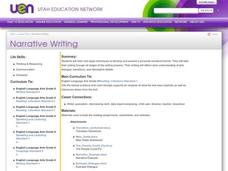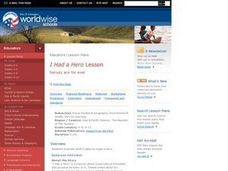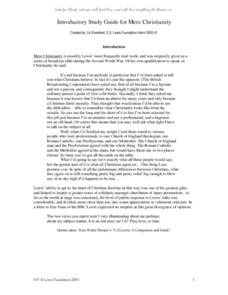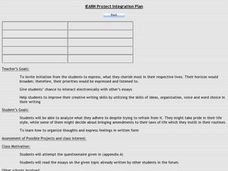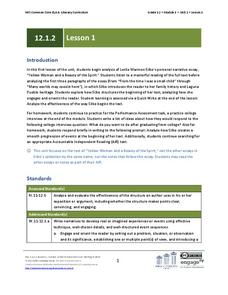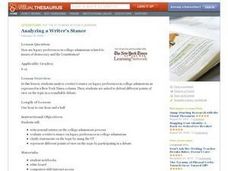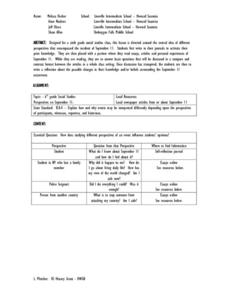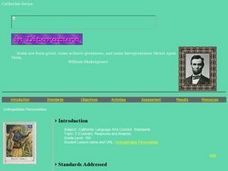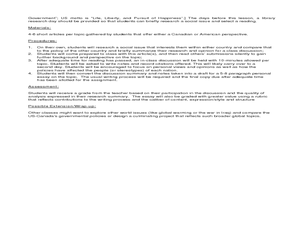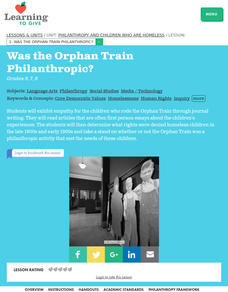Annenberg Foundation
Spirit of Nationalism
What were the virtues and values that helped form America? Pupils watch and discuss a video, read biographies of early Americans, chart the differences between early American religious movements, write journals and letters, draw, and...
Curated OER
New York City Delights: The Taxi Cab
You set the rate! Step into the shoes of a taxi driver in New York City, and also pretend to be a person who uses taxis to get around town. The class will conduct collaborative research to learn about the history of taxis. Then, they...
Curated OER
Narrative Writing
Binoculars are used as a metaphor for good descriptive writing. Class members first view a small picture and then an enlarged view of the same image in which the details come into focus. Next, learners examine a paragraph lacking sensory...
Federal Reserve Bank
Credit Reports—and You Thought Your Report Card Was Important
Get the facts about credit and take a close look at what factors into a consumer credit report with this fantastic lesson. Your pupils will read informational texts, read sample financial documents, and discuss the advantages...
Curated OER
I Had a Hero Lesson
Students read "I Had a Hero" a memoir written by a Peace Corps volunteer serving in the Democratic Republic of Congo. They discuss the story, respond to it in writing, complete comprehension activities and relate the account to their own...
C.S. Lewis Foundation
Study Guide to Mere Christianity
Delve into the arguments central to Christianity as C.S. Lewis in Mere Christianity creates a rational case for his religion. Although slightly preachy in its format, this resource fully outlines, in two different sets, the essential...
Heritage Foundation
Procedural Rights: Amendments VI, VII, and VIII
Even in court, your class members have procedural rights provided by the amendments. Teach high schoolers this important lesson by using the 18th installment of a 20-part unit exploring the US Constitution. The resource provides several...
Echoes & Reflections
Survivors and Liberators
The end was just the beginning. The period immediately after the end of World War II and the Holocaust is often called "The Return to Life" as survivors looked to reunite and recreate broken families and shattered lives. A two-lesson...
Echoes & Reflections
The "Final Solution"
Nazi policies shifted from deportation and imprisonment to extermination of the Jewish people in death camps in the "Final Solution." Learners examine photos of artifacts, read poetry written by survivors, analyze testimony from...
Harry S. Truman Library & Museum
Marshall Plan: Convince the American People
This is an excellent resource for US history classes, especially AP history. After learning some background on the Marshall Plan, the class, divided into two groups, researches opposing positions on this aid program. Groups read and...
Curated OER
Children's Media and Censorship
High schoolers form opinions about children and television censorship after analyzing literature. They complete a journal writing activity to identify the topic and make a list of inappropriate television shows for children. Next, they...
Curated OER
Language Arts: Laws of Life
Students participate in the iEARN Project by completing a questionnaire about values and lessons they have learned. They read sample essays by other students in the project about their views on the laws of life. They then write and post...
EngageNY
Grade 12 ELA Module 1, Unit 2, Lesson 1
As part of a study of narrative writing, class members analyze how Leslie Marmon Silko structures the beginning and orients and engages readers in her narrative, "Yellow Woman and a Beauty of the Spirit."
Curated OER
Analyzing a Writer's Stance
Should college admissions decisions be based on whether whose family members attended? Secondary students read and respond to a New York Times article on the issue of 'legacy preferences' in college admissions. Following class...
Beverly Hills High School
Congress of Vienna 1815
Europe was changing in the early nineteenth century, and the Congress of Vienna largely sought to slow and contain those sweeping changes. A slideshow presentation illustrates the details of the Congress of Vienna, including its three...
Nemours KidsHealth
Conflict Resolution: Grades 9-12
Conflicts happen. Learning to deal with them positively, manage anger, and communicate feelings is the focus of a lesson that gives high schoolers the tools they need for conflict resolution. After reading a series of related articles,...
Curated OER
The Incident of September 11th
Sixth graders identify and write in their journals in order to activate prior knowledge on the events that surround September 11th. Students, with a partner, read various essays, articles and personal experiences of September 11....
Curated OER
Unforgettable Personalities
Students read an essay titled, "Unforgettable Personalities" to study the influence of character's traits on the resolution of conflict in a narrative. They discuss and complete a worksheet that compares their own personality traits to...
Curated OER
A Look at U.S. and Canadian Approaches to Individual Liberties
Students compare and contrast Canadian and U.S. policies regarding social issues. In this sociology lesson, students research social and governance policies in the countries and write personal essays using their findings.
Curated OER
Philanthropy And Children Who Are Homeless Lesson 2: Was the Orphan Train Philanthropic?
Young scholars study the lives of homeless children who rode the Orphan Train by reading first person essays of the children's experiences. They examine what rights were denied to the homeless children during the late 1800's and decide...
C.S. Lewis Foundation
Study Guide to Surprised by Joy
This resource makes accessible the text that portrays the occurrences leading to C.S. Lewis’s finding of God. It encourages the reader to personally reflect upon, and examine Surprised by Joy. The document is divided into two sets where...
Curated OER
Step into the Painting: Social Studies, Literature, and Art
Travel back in American history to the era of slavery and abolition. After reading about the Underground Railroad, young historians examine a painting depicting the event, and write a narrative from the point of view of a person in the...
Curated OER
When I Set My Hat at a Certain Angle: Trying on Zora Neale Hurston's Voice to Dress-up Prose
After reading and evaluating examples of prose nonfiction by Zora Neale Hurston and other authors, high schoolers write a personal reflective essay rich in figurative language. By incorporating this strategy, they utilize voice within...
Maryland Department of Education
The Concept of Diversity in World Literature Lesson 9: Debating Imperialism
To gain an understanding of Imperialism, class members read Rudyard Kipling's poem, "The White Man's Burden" and Mark Twain's essay, "To the Person Sitting in Darkness." Groups compare these perceptions of non-white cultures with the...




